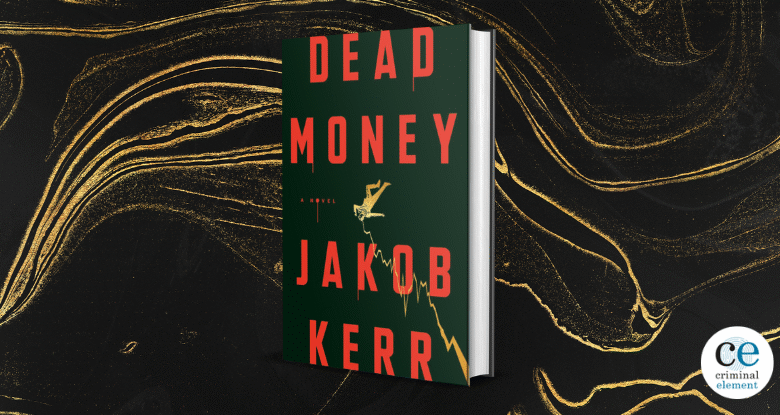Book Review: Dead Money by Jakob Kerr

Featuring jaw-dropping twists and a wily, outsider heroine you can’t help rooting for, Dead Money by Jakob Kerr is a brilliant sleight-of-hand mystery. Keep reading for Janet’s review.
Dead Money is impossible to pin down. Is it a roman à clef set in the Bay area? Definitely. You’ll wonder, is that Mark Zuckerberg, Elon Musk, Kara Swisher, or Sheryl Sandberg, to name a few über-famous denizens of the Bay area tech community. From Silicon Valley to Burning Man, Oakland lawyer Jakob Kerr has an insider’s knowledge of the lives of tech-bro billionaires. I lived in the North Bay for more than twenty years so I can attest to the accuracy of Kerr’s descriptions of Tiburon and Belvedere. Dead Money is a manual to the intricacies and pitfalls of Venture Capitalism at the highest levels. Some scenes read like they’ve been airdropped from the pages of Graydon Carter’s online airmailweekly. Throw in some serious dark money, obtained through extremely questionable financing arrangements, both foreign and domestic, and prepare yourself for a wild ride, where nothing is as it appears.
Like so many good mysteries, Dead Money opens with a dead body. Imagine being the graveyard shift custodian of a vibrant headquarters, populated during the day by “an idealistic thrum of twenty-something tech workers.”
The craft beer taps were covered.
The ping-pong taps were pingless.
The arcade games were unplugged, the movie theater shuttered, the alternative-milk frothers cleaned and dormant.
The last stop of Tony’s night at the Journy’s headquarters is reached by an “inconspicuous elevator” that has a portrait of Trevor Canon next to it, Canon being “the CEO and founder of Journy,” a company that dominates the urban transport vehicles” marketplace. We’re talking “UTVs: electric scooters (Scoots), pedal-assist bikes (Glides), and square, covered golf carts (Buggies),” all “painted in the bright traffic-light green of Journy’s corporate branding.”
There’s a light on in Trevor’s office. “If Tony saw light in Canon’s office, his orders were ironclad: Get back on the elevator and leave.” Protocol goes out the window when Tony spots blood: “A narrow, serpentine trail of red seeped across the foyer floor.” Tony’s understandably nervous but he opens the door and finds Trevor’s body “splayed across the floor,” killed by a bullet through his head.
Weeks pass and the San Francisco police have not arrested a suspect, let alone solved this high-profile crime. Lawyer turned investigator Mackenzie Clyde is told by her boss, Roger Hammersmith, owner of Hammersmith Venture (HV), that she’ll be working alongside the FBI to find Canon’s killer. There’s a backstory to Hammersmith’s request. HV has invested five billion dollars in Journy. After Canon’s death, as the largest outside investor, HV would ordinarily take the reins. But just before Trevor Canon was murdered, he amended his will. Mackenzie makes the natural assumption that “he knew someone was planning to kill him,” thinking why else make a change? Hammersmith fills her in.
“The lawyers call it a ‘dead money’ provision. It said that in the event Trevor was killed, all of his assets would be frozen.”
“Frozen? Until when?”
“Until someone is tried for his murder.”
Mackenzie said nothing for a long moment. “You’re kidding.”
Hammersmith’s expression was hard to read. “I wish I was.”
Hammersmith is a powerful player in San Francisco’s pantheon of tech bros and investors. He really didn’t leave the FBI with a lot of options when he told them Mackenzie will “represent” the firm in the investigation. N.B. investigator doesn’t quite sum up Mackenzie’s skill set. Yes, she’s “someone who finds things” and a problem solver but she’s more. Mackenzie comes from nothing, she’s relentless, as smart as a whip, and towers over most men. Threaded through Dead Money are flashbacks to Mackenzie Clyde’s backstory, which is reminiscent of Horatio Alger’s rags to riches tales.
Enter the FBI: Mackenzie is tasked to work alongside Special Agent Jameson Tanner. He’s young, without “much of a track record,” but Mackenzie doesn’t underestimate him, even if, initially, keeps her at arm’s length. Tanner doesn’t hold back: “We don’t partner with amateurs. Especially not a VC lawyer with zero criminal training.” But Mackenzie has a job to do, which is to unlock the money her boss’s company invested in Journy, Tanner’s disdain for venture capitalist notwithstanding. Tanner and Mackenzie conclude that only Canon’s closest associates had the access necessary to shot him between the eyes—but proving that is complicated. Everything hinges on what Canon was working on at the time of his murder.
It bears repeating—Dead Money is a wild ride, where nothing is as it appears. The plot is prescient, illuminating the dangers of what lurks behind the glittering façades of high-profile money and excess. The idea of world-domination through the technology of artificial intelligence is not the purview of science-fiction writers anymore: Dead Money serves up realpolitik with a veneer of American panache. Dead Money is Jakob Kerr’s first mystery—the first of many, I hope.
Learn More Or Order A Copy




